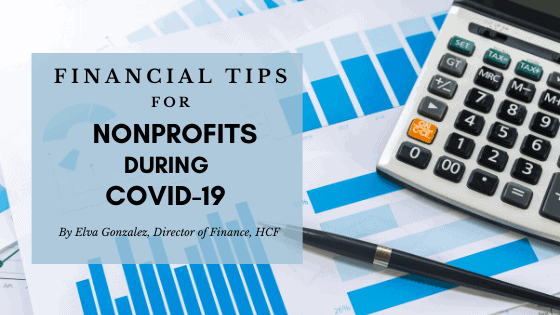
03 Apr Financial Tips for Nonprofits during COVID-19
Share This ArticleOur Director of Finance, Elva Gonzalez, provides some guidance for nonprofit organizations to maintain financial health as we navigate the challenging times of COVID-19.
The COVID-19 pandemic has brought on unprecedented disruption to our lives and in our work. For our grantee partners, they are diligently adjusting their operations to fully serve their clients while providing a safe working environment for their employees. However, the challenges they and the nonprofit sector, in general, face are daunting. We hope to highlight key items to keep in mind and help maintain organizational sustainability during these times.
KEEPING THE LIGHTS ON: UNDERSTAND YOUR CASH POSITION [1]
It is important to have a clear understanding of your organization’s current cash balance and operating expenses. This information will provide a sense of your organization’s financial health, assuming no additional income is received while operating at its current rate. Understanding your cash position will also help your organization prioritize short-term activities and decide what next steps to take.
With many spring fundraising events cancelled or postponed, a significant stream of revenue has been lost or is at-risk for nonprofit organizations. You can reach out to funders and donors and respectfully request they honor their commitments in order to maintain an operational cash position. You can also reach out to vendors to extend payment terms to 90-plus days which can provide relief to focus on immediate needs brought on by the pandemic.
TAXES, TAXES, TAXES
On March 20th, Treasury Secretary Steven Mnuchin announced that the due date for filing of tax returns for individuals and corporations was moved from April 15 to July 15, 2020. Mnuchin proclaimed, “All taxpayers and businesses will have this additional time to file and make payments without interest or penalties.” However, if your organization is expecting a refund, it is recommended you file in a timely manner to receive it soon.
NEWS ON UBIT
This brings us to the next relevant topic: UBIT. You may remember that a year ago we were trying to understand the tax impact of the 2017 Tax Cuts and Jobs Act (TCJA) for nonprofits that provided fringe benefits to employees in the form of parking and transit benefits, like subsidized CTA or Metra passes. These organizations were subject to pay Unrelated Business Income Tax (UBIT) at a tax rate of 21%, and required to file Form 990-T, which many had never filed before. In addition to the new imposed tax, this created an administrative burden and additional cost.
We can share some much-needed GOOD news–the Taxpayer Certainty and Disaster Tax Relief Act of 2019 was signed into law on December 20, 2019 and retroactively repeals the 2017 TCJA!
As a result, organizations that filed and paid tax on transportation fringe benefits via Form 990-T on or after December 31, 2017, can obtain a refund. Therefore, it is important to consult with your Certified Public Accountant to ensure your organization receives any refund you are entitled to. [2]
These are challenging times, but you are not alone. Feel free to reach out to me if you have any questions about these tips. It is inspiring to see the support and unity among funding partners, nonprofits and the larger community. Together we will do our best to weather the storm.
Elva Gonzalez, Director of Finance
Elva has over 20 years of finance and accounting experience in both corporate and nonprofit sectors. Before joining Healthy Communities Foundation, she held various leadership roles at Motorola, Inc. and owned her own accounting firm. She is a Certified Public Accountant and holds a Bachelor of Science degree in Accounting from the University of Illinois Chicago.
[1] “Sustainability to Survivability: 5 Nonprofit Finance Must-Do’s in the Time of COVID,” Steve Zimmerman
[2] “Tax-Exempt Organizations Alert”, Patricia S. Marx and Jodi Patt


Sorry, the comment form is closed at this time.